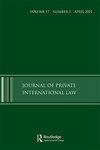The effectiveness of foreign jurisdiction clauses in Nigeria: an empirical inquiry
IF 0.5
Q3 LAW
引用次数: 0
Abstract
Business entities do not often include terms in commercial agreements unless those terms are relevant and are designed to maximise the gains of the parties to the agreement. To realise their reasonable and legitimate expectations, they expect that contractual terms and promises would be respected by the parties and courts. There is a growing body of literature suggesting that Nigerian courts are not giving maximum effects to foreign jurisdiction clauses (FJC). What is largely missing from the scholarly contributions is that no one has worked out a principled solution to overcome this conundrum. This article significantly contributes to the existing literature through an empirical analysis of Nigerian appellate court decisions on FJCs with a view to gaining deeper insights into the attitude of Nigerian courts to FJCs. Compared to the US where the national average of enforcement is 74%, a 40% rate for Nigeria does not project Nigeria as a pro-business forum. This outlook can potentially disincentivise cross-border trade and commerce between Nigeria and the rest of the world. To address this problem, the paper proceeds by presenting a normative framework, built principally on economic and contract theories, for enforcing FJCs. As most of the cases are B2B transactions, the paper invites the courts to treat FJCs and arbitration clauses equally and to replace forum non conveniens considerations with a more principled approach which limits non-enforcement to overriding policy, and a strong cause that is defined by reasonableness and foreseeability.外国管辖权条款在尼日利亚的效力:实证研究
商业实体通常不会在商业协议中包含条款,除非这些条款是相关的,并且旨在最大限度地提高协议各方的收益。为了实现他们合理合法的期望,他们希望合同条款和承诺得到各方和法院的尊重。越来越多的文献表明,尼日利亚法院没有最大限度地发挥外国管辖权条款(FJC)的作用。学术贡献在很大程度上缺少的是,没有人找到一个有原则的解决方案来克服这个难题。本文通过对尼日利亚上诉法院关于FJC的裁决进行实证分析,对现有文献做出了重大贡献,以期更深入地了解尼日利亚法院对FJCs的态度。与美国的全国平均执法率为74%相比,尼日利亚40%的执法率并不意味着尼日利亚是一个支持商业的论坛。这种前景可能会抑制尼日利亚与世界其他地区之间的跨境贸易和商业。为了解决这个问题,本文提出了一个主要基于经济和合同理论的执行FJC的规范框架。由于大多数案件都是B2B交易,本文请法院平等对待FJC和仲裁条款,并用更具原则性的方法取代法院不方便的考虑,将不执行限制为压倒一切的政策,以及由合理性和可预见性定义的有力理由。
本文章由计算机程序翻译,如有差异,请以英文原文为准。
求助全文
约1分钟内获得全文
求助全文

 求助内容:
求助内容: 应助结果提醒方式:
应助结果提醒方式:


